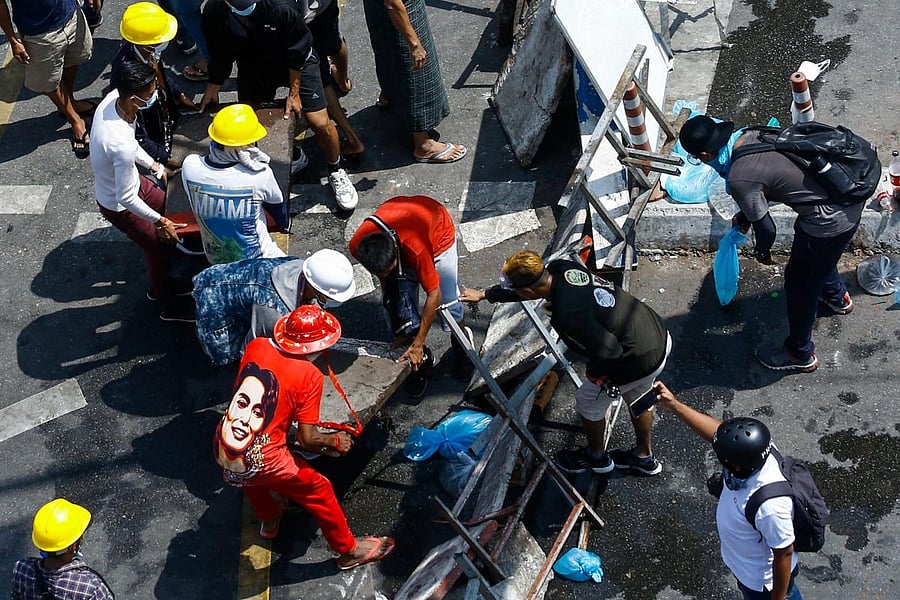
Myanmar's military seized power on February 1, arresting the country's democratically elected leader Aung San Suu Kyi.
This sparked a massive opposition street movement that the junta has since battled to contain, with the crackdown escalating on Sunday. A recap of events:
The generals staged a coup on February 1, detaining Nobel peace laureate Suu Kyi and her top political allies in pre-dawn raids.
It ends Myanmar's decade-long experiment with democracy after close to half a century of military rule.
The generals claim fraud in November's elections, which Suu Kyi's National League for Democracy (NLD) party won by a landslide.
The putsch draws global condemnation, from Pope Francis to US President Joe Biden.
Two days after the coup, authorities bring an obscure charge against the 75-year-old Suu Kyi -- over unregistered walkie-talkies at her home, an offence under import and export law.
Read: Myanmar protesters march again after bloodiest post-coup unrest
Resistance to the coup begins with people banging pots and pans -- a practice traditionally associated with driving out evil spirits.
The junta tries to block social media platforms including Facebook, which is hugely popular in Myanmar. Later, nightly internet blackouts are imposed.
Suu Kyi, not seen in public since the coup, is under house arrest and "in good health", her party says.
Popular dissent surges over the weekend of February 6 and 7, with tens of thousands of people gathering on the streets calling for the release of Suu Kyi.
Workers begin a nationwide strike on February 8.
The military warns of a crackdown and imposes night-time curfews including in Yangon, Mandalay and Nay Pyi Taw -- the country's three biggest cities.
A young woman is shot in the head and another person is wounded after police fire on crowds in Naypyidaw on February 9.
Despite the violence and a raid on the NLD's headquarters in Yangon, tens of thousands of people take to the streets of the city for a fifth successive day.
Also read: Myanmar's Aung San Suu Kyi hit with two new criminal charges
UN special rapporteur Tom Andrews warns that the junta "can't steal the hope and resolve of a determined people".
The same day Washington announces sanctions against several military officials, including General Min Aung Hlaing, the army chief now in charge.
On February 16 Suu Kyi's lawyer says she has been hit with a second charge, this time under the natural disaster management law.
The next day thousands rally in Yangon vowing to "fight till the end", despite the build-up of troops.
Britain sanctions three Myanmar generals on February 18 for post-coup rights violations, as Canada takes similar measures.
The protester shot 10 days earlier dies on February 19, becoming a symbol of opposition to the junta.
Over the next days, two more demonstrators are killed and around 30 are injured as police fire on a protest in Mandalay.
In Yangon, a man on neighbourhood patrol against night arrests is shot dead.
UN chief Antonio Guterres rebukes the junta's "brutal force", with the European Union later agreeing to sanction the military. The G7 group of the world's wealthiest nations add their condemnation the following day.
The next day the social media giant and its subsidiary Instagram turn the screw on the junta by banning all accounts linked to the military.
The World Bank also confirms it has told the regime all lending will be cut off.
In a significant escalation of force on Sunday, troops and police fire live bullets on unarmed demonstrators across the country. The UN says it has credible information at least 18 people had died.
AFP independently confirms eleven deaths in the day's violence, although there are fears the toll could be much higher.
Appearing in court via video link on Monday, Suu Kyi is hit with two new criminal charges. Her lawyer says she is now also accused of a violation of communications laws as well as intent to incite public unrest.